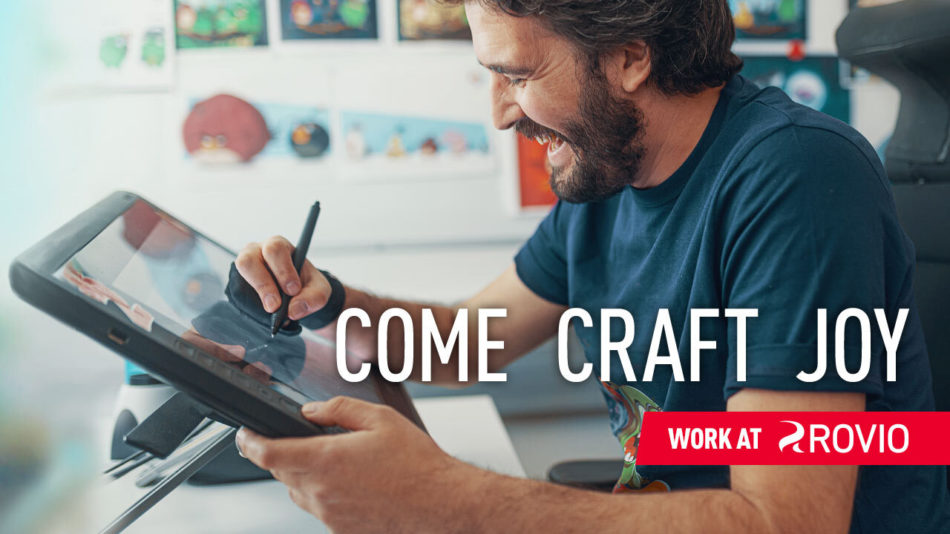
Hear from Rovio Lead Machine Learning Engineer, Ignacio Amaya, about the potential machine learning has to revolutionize the gaming industry.
You might already know that Rovio creates popular video games, including Angry Birds 2, Angry Birds Dream Blast, Angry Birds Friends and many more. What you might not know is that by the year 2022, Rovio has pledged to make their products even better by specifically tailoring games to individual players using machine learning.
Imagine a world where games can adapt to your personal play style, changing art style, level design, and difficulty on the fly to maximize your enjoyment according to your personal preferences. That’s the kind of uniquely personalized experience that Rovio’s machine learning team is working toward. While this might sound like a futuristic promise, as Lead Machine Learning Engineer Ignacio Amaya explains, the future isn’t that far away. Leading Rovio’s machine learning team, Ignacio works with other machine learning engineers to gather data and understand how games are performing. With that data, the team can then train and implement machine learning models in games. The majority of the mobile games industry still largely depend on A/B tests for optimal game configuration. But, Ignacio makes it clear that thanks to machine learning, the personalization process of our digital lives has already begun—and will only get better.
“Traditionally, personalization in mobile games has relied on complex rules which are often sub-optimal and hard to maintain,” Ignacio explains. “Recommendation platforms based on machine learning can reduce that maintenance overhead and help to create better games. Such systems can be found in e-commerce and online video platforms but are not that common in gaming because games usually entail bigger complexity. However, the gaming industry is catching up with this trend and some bigger gaming companies are already experimenting with using machine learning for recommendations, matchmaking, or helping players when they get stuck…At Rovio, ‘tailored’ means a game that is optimized for a particular individual. That means that we treat it as an optimization problem where we try to maximize how much fun our players have when playing our games. But, how can we know if our players are having fun? Engagement metrics and in-game behavior data can be used by our models as a proxy for fun.”
...we treat it as an optimization problem where we try to maximize how much fun our players have when playing our games.
The potential for personalizing games is staggering. But it also makes sense—Netflix, for example, applies similar techniques to increase user engagement, using viewer data to display the most appealing film cover, summary, and search results. Why wouldn’t gaming systems do the same?
“Each player would have a version of the game that is customized to maximize his joy,” says Ignacio. “So they will find in our games more of the things they enjoy, and less of the things they dislike or frustrate them…’Personally tailored games’ means that the game should feel unique for each player. We know that different players have different preferences; for example, while I may enjoy strategic games, other people might prefer more casual gameplay, but we could enjoy the same games if the game ‘knows’ what we want and adapts to our tastes.”
Obviously, creating a game with a multitude of variable elements means more details, which translates to more work. But Ignacio considers it a worthy challenge that will ultimately pay off in better all-around user experiences and player satisfaction. He’s also excited to work with a team that’s eager to embrace the challenge that comes with refining new technology.
“Machine learning allows us to leverage the data we have from our players’ behavior to provide better in-game experiences for them,” he confirms. “Instead of coming up with a globally optimal version of our games, we can have multiple game versions live at the same time. Machine learning is the tool we use to detect the best game version for a given player. In some senses, it might make life more complicated, as you don’t have just one version of the game, but instead different players may get a different experience. It could create more work for game teams, as in some cases they need to create more content. You might need different versions of the game content for the different player segments. However, the need to make compromises and focus only on one target group of people is reduced, so that gives the game teams more freedom to create better games.”
Machine learning allows us to leverage the data we have from our players’ behavior to provide better in-game experiences for them.
As the field of machine learning advances at a rapid pace, personalized products are only the start. With the help of machine learning, games will become increasingly more intricate. Titles will be released more often. And maybe one day, we’ll be playing games created entirely by machines themselves.
“Content generation is a hot topic nowadays with plenty of research underway. It has lots of potential in gaming: generating rich dialogue automatically for non-player characters, creating new music tracks that perfectly fit the game music style, designing 3D game content without the need of specialists, or even creating basic games from the ground up. As a first step we will see these advances as tools to aid content generation, but in ten years we could already have all these different systems to generate content working together with little human supervision, enabling game teams to save a lot of time with repetitive tasks and invest more time innovating and creating new things. Popularization of new technologies like virtual and augmented reality, IoT or 5G could open up a world of possibilities and new use cases where machine learning will play a really important role.“
Ignacio is a member of of of Rovio’s Machine Learning team, one of several tech-focused teams behind Rovio’s games. Interested in working in a tech position at Rovio? Check out open positions here!
